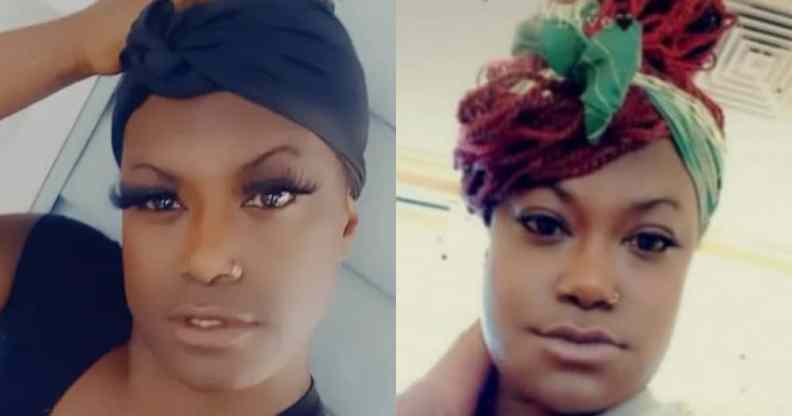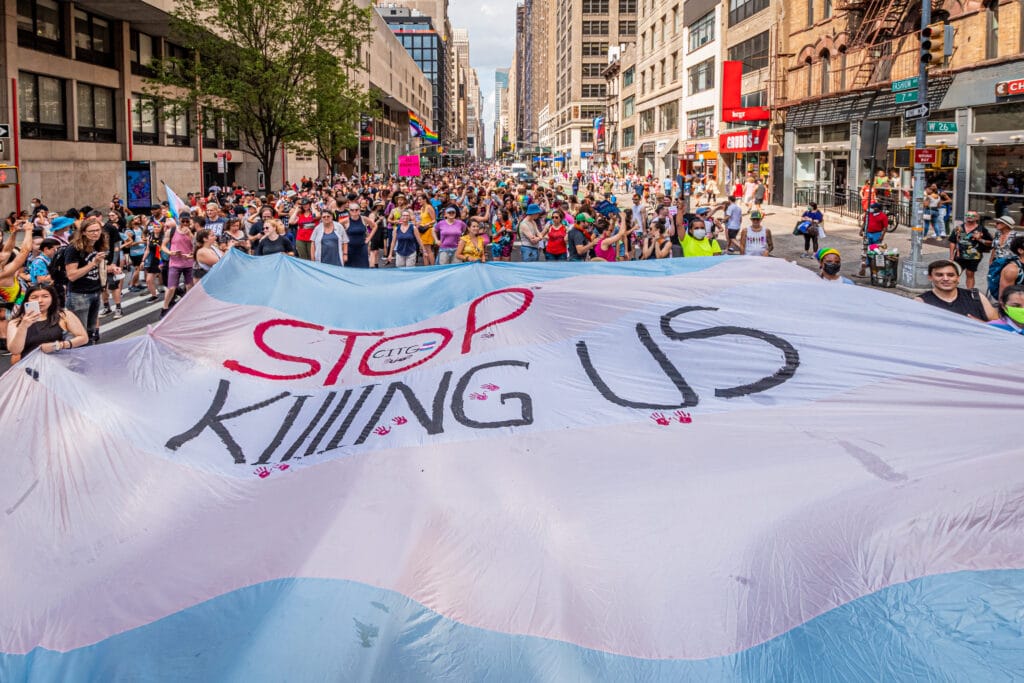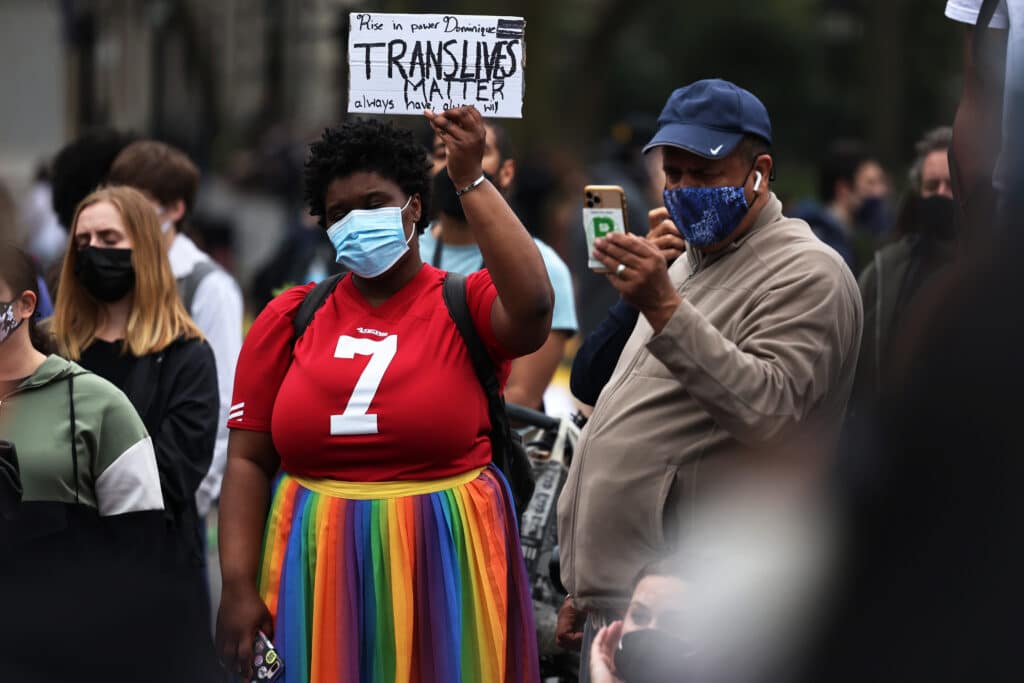Killing of woman with ‘heart of gold’ makes 2021 deadliest year for trans people on record

Marquiisha Lawrence. (Facebook)
2021 has officially become the deadliest year on record for anti-trans violence with the death of Marquiisha Lawrence.
Lawrence, a 28-year-old Black trans woman known for her “infections smile” and “heart of gold”, was fatally shot in Greenville, South Carolina, on 4 November.
She was found dead at her residence on 15 Loop Street by family members, Fox News Carolina reported, which both deadnamed and misgendered the victim.
Per the Greenville County coroner, Lawrence died of gunfire following a scuffle with one or more individuals. At the time of writing, the Greenville County coroner’s office and Greenville County sheriff’s office are continuing to investigate.
She is “at least” the 45th trans, non-binary or gender non-conforming person to be slain in the US this year, according to the Human Rights Campaign, which has been documenting the killings.
The LGBT+ advocacy group warns that 2021 is now officially the most deadly year for trans and non-binary people since its records began in 2013.
It eclipsed last year’s tally of 44 deaths – there are still two months of 2021 left.
Marquiisha Lawrence’s death is latest in ‘alarming and frightening’ wave of killings
Described by her trans mother as a “humbled free-thinker, loved by many”, Eboni Sinclaire told the HRC that Lawrence was the victim of a “senseless murder”.
Lawrence studied cosmetology at Spartanburg, a northern city in the state known for its wondrous mountains and sandy beaches. A residential aid, dancer and keen cook, Lawrence supported herself day-to-day with odd jobs.
“Her favourite thing to do was to cook,” Sinclaire said, “because she felt it filled the belly and fed the heart.
“One of our last conversations she said to me: ‘I’ve not always been the best I could be, but thank you for caring enough to still be here for me.'”
She was killed, Sinclaire said, for “accepting who she was and living her truth”.
Marquiisha Lawrence did not deserve to die, Tori Cooper, who helms the HRC’s Transgender Justice Initiative, told PinkNews.
This year, Cooper explained, has seen a “number of things surface at the same time” that has created a climate of fear for trans people.
For Cooper and many Black trans people, the Trump administration was a moment where America “lacked empathy and compassion for people because that wasn’t being modelled to us”.
But such apathy was unsurprising, she said. Trump was simply the latest in the centuries-long history of systemic racism that today “empowers folks who seek to do harm and seek to turn back the hands of time and to make America racist again.”
And in an America without Donald Trump in the White House, Cooper recalled an initial sense of elation and relief that Joe Biden had emerged victorious in the 2020 presidential election.
Yet, as much as so many could at long last “breathe again”, Biden’s win was not a guarantee of safety for those who are the most vulnerable. Trump’s impact still haunts America, and trans people are paying the price.
“It’s alarming and frightening as a human being who is an observer by nature,” Cooper said, “I think what we’re seeing is people picking on folks who they can pick, the folks who are at the bottom of the totem pole.
“To ignore the political climate that we just escaped from,” she added, “would be inappropriate.”
Brazen violence against trans people a sign of deepening loss of ’empathy’, say activists
Cooper knows this. Her trans siblings have been deadnamed and misgendered in police and press reports for as long as she can remember – according to the HRC’s estimates, some three-quarters of trans homicide victims are.
“It’s always been a part of the community. We’ve always known that this has existed and I am appalled that there are folks who refuse to acknowledge the epidemic of violence against trans people.”

A spate of killings has shuddered fear throughout the trans community. (Erik McGregor/LightRocket via Getty Images)
Local police agencies have a long way to go to assist federal law enforcement in accurately cataloguing transphobic homicides.
And when some states don’t even allow trans people to change the gender markers on their identity documents, it can make it even harder to accurately identify a victim’s identity.
This lack of reliable data can make it even more difficult to measure the true extent of the hostility trans Americans face, but if there’s one thing Cooper knows, is that it’s rising.
Both the American Medical Association and president Biden have declared the years-long spectre of brutality facing trans Americans an “epidemic”.
Those in power who refuse to be held accountable or minimise such needless violence, Cooper said, are “not only saying they believe this is not an epidemic but are saying that trans people and more specifically trans Black women don’t deserve to be recognised”.

Trans women, particularly Black women, face disproportionate rates of violence. (Michael M. Santiago/Getty Images)
Higher levels of homelessness, poverty and unemployment among trans people give way to elevated risks to their safety, with gun violence, in particular, being an issue.
According to the 2017-2019 Transgender Homicide Tracker, three-fourths of confirmed homicides against trans people have involved a gun.
And for Black trans women, racism exacerbates this. Eight in 10 homicides of Black trans women involve a gun.
While according to the 2015 United States Transgender Survey, 54 per cent of trans and non-binary people have experienced violence at the hands of intimate violence.
“The fact is that there are some people who believe that your right to carry a gun is more important than my right to feel safe around people who can’t pass background checks.”
“We have to relearn how we think about guns, how we think about violence and then make sure we hold people accountable,” Cooper continued, speaking of the coronavirus pandemic as a time where grocery shops shuttered but gun suppliers remained open.
This shows how from school boards to public officials, businesses to the White House, “we need more from everybody,” said Cooper, before concluding: “It’s why we really need our cis allies to be in this fight along with us.”
Tyianna Alexandra, a 28-year-old Black trans woman, was shot and killed in Chicago in the early hours of 6 January, becoming the first known violent killing of a trans person in 2021.
Since then, the community has mourned across 2021: Samuel Edmund Damián Valentín, Bianca Bankz, Dominique Jackson, Fifty Bandz, Alexus Braxton, Chyna Carrillo, Jeffrey ‘JJ’ Bright, Jasmine Cannady, Jenna Franks, Diamond ‘Kyree’ Sanders, Rayanna Pardo, Dominique Lucious, Jaida Peterson, Remy Fennell, Tiara Banks, Natalia Smüt, Iris Santos, Tiffany Thomas, Jahaira DeAlto Balenciaga, Keri Washington, Sophie Vásquez, Danny Henson, Whispering Bear Spirit, Serenity Hollis, Oliver ‘Ollie’ Taylor, Thomas Hardin, Poe Black, Novaa Watson, Aidelen Evans, Taya Ashton, Shai Vanderpump, Tierramarie Lewis, Miss CoCo, Pooh Johnson, Disaya Monaee, Brianna Hamilton, Kiér Laprí Kartier, Mel Groves, Royal Poetical Starz, Zoella Rose Martinez, Jo Acker, Jessi Hart and Rikkey Outommuro.

